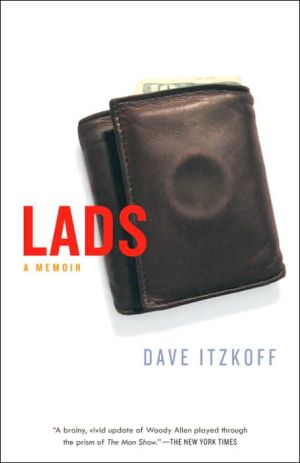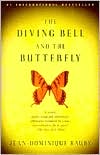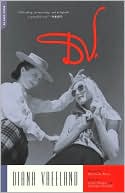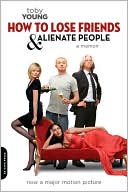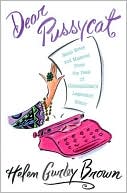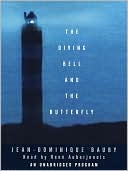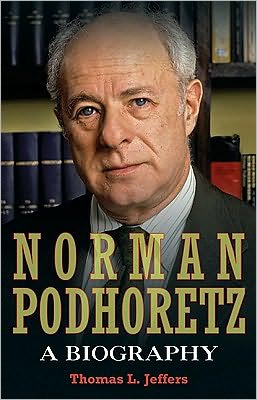Lads: A Memoir
"What I wanted after college was a job and my own apartment, but what I needed was a good comeuppance, and that’s what I got."\ \ When Dave Itzkoff graduated from Princeton in 1998–the first member of his family to earn a college degree–he expected to be rewarded with a career, and a life, that mattered. Instead, he ended up convinced that he was selling the entire institution of manhood down the river. \ After a series of personal and professional experiences stripped him of any lingering...
Search in google:
"What I wanted after college was a job and my own apartment, but what I needed was a good comeuppance, and that's what I got."When Dave Itzkoff graduated from Princeton in 1998-the first member of his family to earn a college degree-he expected to be rewarded with a career, and a life, that mattered. Instead, he ended up convinced that he was selling the entire institution of manhood down the river. After a series of personal and professional experiences stripped him of any lingering sense of entitlement, Itzkoff found himself working as an editor at Maxim, the pugnacious frontrunner in a new breed of men's periodicals dubbed "lad magazines." There, he was initiated into a culture of heavily retouched girlie pictorials, dirty jokes, disingenuous sex advice, and shopping guides for expensive electronic gadgetry. And as Maxim continued its inexorable rise to become the most successful men's magazine in modern publishing history, Itzkoff was left wondering what his work-and his life-really meant.Lads is the hilarious, heartbreaking story of Dave Itzkoff's efforts to define himself as a man while working at a magazine that was purveying a vision of young manhood-a state of perpetual adolescence-that was seductive to all but viable for none. Lads takes us deep inside one young man's struggle with identity, responsibility, and sexuality, in an unsparingly candid account of how men really relate to one another, as fathers and sons, as employers and employees, as colleagues and friends.Lads is trenchant. Lads is perceptive. Lads is alarmingly funny. This is an unforgettable debut from a young writer of astounding talent. Publishers Weekly After graduating from Princeton in 1998, Itzkoff entered the world of lad magazines, first at Details and then at Maxim. His book's central irony is that at the center of the hot babes-filled men's mag world, one of its editors can't get no satisfaction. So much of Itzkoff's time in New York is spent being teased, led on and rejected by neurotic women that the book sometimes resembles an ode to onanism. It's fantastic gallows humor; even in the bleakest scene-an attempted suicide-Itzkoff maintains his satirical flair, marveling that drugstores allow crying, inebriated customers to buy as many bottles of sleeping pills as they can carry. But beyond the pleasures and pains of reading a glint-eyed insider's account of the publishing world and its denizens, this is a more universal story of a troubled father-son relationship. Itzkoff's dad is a manic-depressive furrier struggling to stay straight and sane after a decades-long cocaine addiction. Itzkoff eventually leaves Maxim and reconciles with his father-the move from lads to dad a sign of a late-but-redemptive maturity. Unlike with MAD or National Lampoon, there are arguably few things of lasting value that have come out of Maxim's success so far, but Itzkoff may be the exception. Agent, Nina Collins. (Sept. 14) Forecast: Promotions targeting "gossip Web sites" and "men's trend-setting magazines" will attempt to market this book to the elusive lad-lit market. Copyright 2004 Reed Business Information.
1.\ \ ALL GOOD THINGS\ \ What i wanted after college was a job and my own apartment, but what I needed was a good comeuppance, and that's what I got. A liberal arts education had provided me with many valuable lessons: Do not attempt to take the determinant of a nonsymmetrical matrix. Do not carry a balance on your credit card. Do not enroll in two consecutive semesters of any course taught by Joyce Carol Oates. Do not mistake two hundred and fifty years of consistency for proud tradition. And do not, under any circumstances, tell a girl that you're attracted to her unless you're absolutely certain that she reciprocates those feelings, and even then, do not do so unless she's already confessed as much to you first. But only some of these lessons would prove useful outside the classroom, and I desperately needed to find out which.\ \ The days leading up to graduation had been a flurry of activity, of neglecting to say good-bye to the people I hoped to stay in touch with, of constantly crossing paths with the people I prayed never to see again, and of trying to cram all my possessions into four equal-size cardboard boxes. And then it was over. Hours before the ceremony, I had been listening to varsity rowers–turned–investment bankers and mechanical engineers–turned–management consultants discuss how they were going to divide up the known universe. Now, in the time it took me to drive the length of the New Jersey Turnpike, I had completed my transformation into another shut-in who lived with his parents. All I had to show for the experience was a piece of paper written entirely in Latin, mounted on a plaque with my alma mater's name at the bottom. Still,it wasn't a total wash. "Don't you get it?" a former roommate had explained to me. "Your résumé is going to say ‘Princeton' on it. You automatically win."\ \ The meager amount of defiance I could muster at the time had been channeled into my entry in the senior class yearbook, the same stock picture of a yawning tiger that stood in for every student who didn't bother to submit a photograph, accompanied by my insightful parting words for the class of 1998: a lyric from a Bob Dylan song that ended with the line "I'm goin' back to New York City, I do believe I've had enough." To the extent that rock music can ever mean anything, it was a perfect encapsulation of my feelings in that final semester--my overwhelming urge to get as far away from institutional insularity as possible and return to Manhattan. It was more than just the city of my birth--it was the town where my fellow Jews had turned up their ample noses at my arriving ancestors and sentenced them to a life of sharecropping in the South, where previous generations of Princetonians had come to seek themselves in alcoholic binges and the arms of dubious women with names like Zelda, where no one cared if you succeeded and everyone hoped that you'd fail. I thought I had a score to settle, but the quotation was more of a boast than a battle plan. Instead of going back to New York City, I found myself driving parallel to it, and then past it, to resume my life in exile, in a suburb so sleepy and unremarkable that not even Billy Joel would have bothered to commemorate it in verse.\ \ As a sort of graduation gift, my parents had offered me their assistance in transporting some of my belongings home, and when I pulled into the family garage they were waiting for me, shuffling things around, preparing to turn the space into a permanent shrine to the four years I spent apart from them.\ \ "It's the college boy," my father bellowed. "Mama, come see the college boy!" This wasn't his normal speaking voice, but a special tone he adopted when one of his children was within earshot.\ \ "Aaaaay," my mother called back, clapping her hands. She was every bit as wiry and willowy as he was big and burly. I was the first member of the family to have earned a college degree, and they were the last generation who hoped to see their children grow up to be smarter than they were.\ \ "So, college boy, what did they teach you? Say something clever."\ \ "Do you think it would be all right if I just unpacked in peace?" I was carrying one of the four heavy boxes, and I was angry. It was too early to be feeling so weary--too early in the day, too early in the summer, too early in my life.\ \ It had been seven years since my parents had moved the family to a town called New City, a community every bit as generic as the name suggested, and one they had never even heard of until they traveled there to buy their first SUV. After a combined ninety-seven years of living in New York, they had thrown in the towel. My father had a good year in business--his first ever, as far as any of us could recall--and decided it was his turn to acquire property, just as he had seen his friends do during the previous decade. "What is this rent?" went his carefully reasoned rationale. "Why should I be flushing my money down the toilet when I could be putting it into something I can own?" His irrational exuberance did not quite explain why he was taking out a thirty-year mortgage at the age of fifty-one.\ \ For my sister, starting a new high school posed no problem and she adjusted marvelously, but for me, it was an adolescent nightmare more scarring than acne. My parents bought me whatever they could afford to help me adapt--new clothes, new car, new nose--but I made no enduring friendships, put down no roots. As badly as I wanted to get out of college, I had once wanted to get in just as intensely. And as sure as I was that I had no desire to return to suburbia, I was starting to feel with equal certainty that I would never escape it. "You know, that bedroom will always be yours," my father would remind me during the occasional phone conversations we shared while I was away. "You can come back to it any time you want." I know, Dad, and that's what I'm afraid of!\ \ Aside from the odor of cat urine that now permeated the air, that ammonia aroma that people who have lived in houses smell- ing of cat urine for several years never seem to notice, everything about my parents' home was just the way I had left it, just the way I'd remembered it. Entering my own bedroom was like wiping away the last four years of my existence--the walls remained covered with posters and newspaper clippings from an era when my affections for Walt Disney movies and professional hockey could still be openly paraded, with the framed, approved learner's permit from the day I passed my driving test--a genuine fucking accomplishment, given that it had taken me three tries. And there, in one corner of the room, was the same bed I had slept in since my boyhood, the same box frame that I had used since I had outgrown my crib, the same antique that I was too ashamed to ask my parents to replace, lest it call any further attention to the incongruous plight of a twenty-two-year-old sleeping in a five-year-old's bed.\ \ But in the days following my return, I began to perceive that certain things were different. My father had gained weight, which made him look more docile than he usually was; he hardly seemed to have any bones in his body, mean-spirited or otherwise. He was also spending considerably more time on the living room couch. That he was on the couch at all wasn't news--since we had moved into the house, he and my mother had stopped sleeping in the same bed. There was no incident or argument that had resulted in this arrangement; it was just something that had become the routine. Besides, it was easier for both of them: She could rest quietly while he slept with the television on all night, another habit he had developed since we left the city.\ \ Now he had expanded his viewing schedule from an already healthy 10.5 hours a day, from the time he got home from work in the evening to when he left for work the following morning, to an even more impressive twenty-three hours, being the full length of a day minus the time he got up to go to the bathroom or the re- frigerator. There had also been a significant change in his attire; he had gone from wearing clothing to slogging around the house in ratty undershirts and cotton briefs. In practice there was surely something wrong with this behavior, but to see it set down on paper, it sure does sound like somebody's idea of the American dream.\ \ It was especially sad to see him like this knowing what he had been like in his prime. My father was a furrier, after his father, and after his father's father, and it was not a vocation into which he entered willingly. As he had told me many times before, his line of work was not so much a calling as it was the result of having failed his freshman year of college--twice. Instead of attending his classes, he stayed in his dorm room the whole semester and played poker. Given a second chance, my father instead gambled away another term, at which point my grandfather forcibly removed him from school and drafted him into the family profession.\ \ I must sheepishly confess that, to this day, I don't completely understand how the fur business works. Essentially, it involves the purchase of raw animal skins at a time when they are plentiful and cheap (the buying season), then holding on to them until such time when they are scarce and in demand (the selling season). Sometimes my father would sell the pelts to manufacturers who, through their own particular alchemy, transmuted the greasy hides into coats or handbag trim. Sometimes he would deal them to other merchants from around the globe, and sometimes he'd sell them back to the same people from whom he'd bought them. Divorced from the actual commodity, his work was really the most basic of economic arrangements. In the end, isn't everything a kind of skin trade?\ \ When we were living in our high-rise Manhattan apartment, before my father was commuting to his office diligently, then infrequently, then never, his job was the source of his vitality, an all-consuming engine that was as difficult to start up as it was to shut down. Each morning from our bedroom, my sister and I would hear him carrying on with our mother: "I'm not going in today! You can't make me! Maddy, please don't make me go! No work today!" But each morning he was compelled to venture into the outside world, and after a full day at his warehouse, located amid the remnants of what was once the city's thriving fur district, he would come home restless, with fur on the brain. There wasn't a dinner table conversation that didn't hinge upon fur in some crucial way, and as best as I could tell, the whole business was always hanging by a whisker--he was perpetually trying to persuade someone to pay him the money they owed him or to give him more time to come up with the money he owed them. Then, after my sister and I had been tucked in for the night, we could hear him barking into the telephone to some associate or another, conducting his spasmodic one-sided conversations, cursing and screaming and asserting his mastery of the industry in short bursts of energy that didn't convey any information:\ \ "Now, Leo, listen to me--listen to me! If these cocksuckers want red foxes, you know what I mean, they're going to have to come to me. . . . Uh-huh . . . uh-huh . . . that's right, Leo. And I'm not gonna let those sonofabitches have just the five hundred or six hundred best pieces, you know what I mean? They're going to have to take the whole lot, Leo. The whole fucking lot! . . . That's right. . . . That's right. . . . Not just the Xs, not just the double Xs, but all of it, Leo, all of it, you know? And I am going to make them pay. If they say fifteen a skin, I'm gonna say twenty. If they say twenty, I'm gonna say twenty-five. . . . Right . . . right . . . 'Cause where else are they gonna get these goods? From Donnie? From Carl? From those no-good cocksuckers up in Montana? Fuck 'em. They ain't got what I got. We got 'em, Leo, we got 'em. We got 'em by the balls, you know what I mean?"\ \ We heard it every night, and to be honest, we had no idea what he meant.\ \ These were the evenings that he bothered to come home at all. The remaining nights of the week, my father was so high on cocaine that it took all of his resolve to propel himself out of his office chair and into the louse-infested comfort of the nearest motel with hourly rates. When I was especially young, I would lie awake wondering where he had gone, worrying for his physical safety--that is, until I was old enough to understand what he was doing, and then I preferred it if he left me alone to conjure up hypothetical scenarios of what might be happening to him in his drugged-up state, instead of forcing me to confront him as he actually was: manic, wild-eyed, and reeking of musk, his own rotten breath, and the lemon air freshener with which he sprayed himself to conceal the other smells. The same click-clack sound of his key turning in the front door that once lulled me to sleep was now an alarm, a call to arms, because it meant that he was home, and he was looking for a fight.\ \ Once he was finished shouting down my mother, he would corner me for hours at a time to proselytize about his progressive attitudes on male-female relations. "Do you understand that sex between a man and a woman is the most beautiful thing in the world?" he'd tell me, nostrils flaring, chest heaving, eyes brimming with chemically induced sincerity. "You should never be afraid of this. My father didn't have the courage to tell me, but I don't want you to be ashamed of sex." At this point in the presentation, he would usually meander from his main thesis to one of three possible digressions: how my mother was the only woman he'd ever had sex with; how lucky he was that my mother would have sex with him; and how difficult it is to convince women to have sex with you. The secrets it had taken him fifty frustrating years to accumulate were mine to benefit from, before I'd even hit puberty. From his perspective, my father must have thought he was doing me a favor.\ \ To my innocent ears it was all nonsense anyway, as incoherent as his midnight chatterings to his business clientele, but there comes a point, even at the age of ten, when you become tired of hearing it. But my father was a man who was strong in his convictions, even more so with a minuscule quantity of cocaine in his bloodstream, and asking him to please stop because, well, he was scaring the shit out of me, that was like a dagger in his heart. That's when he'd threaten to cut me off, kick me out of the apartment, and, worst of all, send me to public school. First, to my mother: "He's out of here, Maddy. I don't want you, or your mother, giving him any money, you got that? You're not to give him one cent!" Then, to me: "It's public school for you! Do you hear me? Public school!" (It should be noted that he did eventually make good on this last threat.)\ \ My upbringing in New York had accustomed me to a certain degree of background noise--the apocalyptic predawn rumblings of newspaper delivery trucks being dispatched onto the streets, of pent-up steam escaping from power plant turbines into the air, of my mother and father screaming slurs like "junkie" and "whore" (two syllables) at each other before I learned what such words meant. Our new rustic existence had brought with it my father's fragile sobriety, but also an eerie, discomforting tranquillity I could never bring myself to accept completely. As I watched my father exercise his dominion over a three-piece sectional sofa and the channels of his TV set, wait for the phone to ring, and otherwise cultivate excuses not to go to his office, I felt only pity--not for him, or for myself, but for all my former classmates, the ones about to embark on their European backpacking adventures or begin their nominal desk jobs in some family friend's firm, the ones now being propelled through life by their faith in the invulnerability of their own fathers, who wouldn't discover the truth about the old man until he was dead from a stroke or indicted for tax evasion--or maybe they'd never find out at all, the poor bastards. I, on the other hand, was more enlightened. I was about to become the only person in my household who was also a contributing member of the American workforce.\ \ \ \ \ \ traditionally, the summer after college is supposed to be one of repose and personal reflection, of furtive keggers and pot parties in idle high school parking lots, of lying poolside while putting off the shackles of responsibility and having affairs with married women while simultaneously courting their daughters. I wouldn't get to enjoy any of these liberties, because I had allowed myself exactly twelve days between graduation and the commencement of my first full-time job.\ \ I'm not certain what it was that initially attracted me to the trainee program at the William Morris Agency, whether it was the sex appeal of the many celebrities whose salaries they negotiated or the day I came to drop off my employment application and thought I spotted Joel Coen in the lobby. Historically, I knew the company had launched the careers of height-challenged Jews from the Marx Brothers to Michael Ovitz, and I was further distracted by an unduly rigorous hiring process that required me to visit their offices on four separate occasions: first to take a typing test, then to meet with a human resources manager, then to meet with a different human resources manager, and then to meet with a panel of their highest-ranking agents, who would pass final judgment on me before casually tossing their tallises over their shoulders and heading off to lunch. I was so overjoyed when at last they offered me a job that I hardly even noticed that the starting wages of $350 a week would render me an Ivy League alum living below the poverty line. Instead, my dwindling days of freedom were spent poring over the training manual they had sent me in the mail, with its capitalized common nouns and its pages upon pages of protocol for correctly conducting telephone calls with the Client, and composing written correspondence for the Agent, and looking for a cheap parking space in the Vicinity of the Building where the Agency was housed, and trying to convince myself that this line of work was a good idea.\ \ As someone who might one day rise to the rank of agent, I was required to arrive at the office in a suit and tie to push a diminu- tive metal cart that carried the mail for the forty-odd assistants of the forty-odd agents and executives of William Morris, five times a day. In between trips around the agency floor, I was relegated to the mailroom, a cold subterranean space I shared with my fellow trainees. When we weren't attending to our appointed rounds, we were shuttling up and down in the building's service elevator, running errands, reading scripts, or congregating quietly in the mailroom lounge. The mailroom manager, a stringy and excitable man of West Indian descent, spent the day sitting behind a soundproof glass enclosure fielding phone calls from upstairs; when our assistance was needed, he'd press a button that triggered a buzzer in the lounge, point to me or one of my properly attired colleagues, and send us on our way.\ \ How any of this was supposed to transform me into a cutthroat Sammy Glick–type macher, I have no fucking clue. What I do know is that I was one of the worst mail carriers in the company's hundred years of operation. I attribute this in part to the thoroughly inadequate preparation I received from another trainee who had been on the job only a few weeks longer than I had, a lanky, soft-spoken Mongoloid with hands bigger than his head, who barely knew the delivery routes himself. The rest of the fault was entirely my own: The burden of carrying the mail made me inordinately nervous--more so--and I couldn't seem to master the arcane system of secret abbreviations the agents used to address their interoffice correspondence. Yet at the end of the summer I was given a promotion out of the mailroom, largely on the strength of a bathroom cleanup checklist I designed for the overnight maintenance crew, a Microsoft Word document so stunning and immaculate that a copy of it remains in my permanent employee file to this day. I had been promoted ahead of the Mongoloid, and I'm told that on the day my good fortune was announced to the mailroom staff, he placed his head inside his colossal hands and cried.\ \ Fifteen stories above, I found myself at the bottom of a very different hierarchy. I was given the title of floating assistant, made an unattached in-house temp who could cover for the permanent assistants who sat at desks placed before each agent's office, filling in whenever they took vacations or called in sick. Except they never took vacations or called in sick, because they knew the day they returned, this little pisher would be waiting in their seat, and he wouldn't leave. The full-time assistants were several years older than me, all college graduates, some even with JD and MBA degrees who had given up lucrative legal and business practices for a shot at the very best kind of money--Hollywood money. They were also, mostly, totally defeated before they reached the age of thirty. Each had achieved much before arriving here: One assistant had orchestrated the legendary reunion of a forgotten seventies-era rock band; another had written a spec script for Sex and the City that everyone agreed was as good as any episode that had made it on the air, whatever that was worth. But their greatest accomplishments were behind them. Now they shared a job that offered them no responsibility more challenging than the introduction of teabags into boiling water, a job in which they had invested so many of their best years that their only remaining options were to continue to hold out for a promotion to agent or start over in an altogether new field. The single mistake they had made was pursuing a career in which even a single mistake would not be tolerated, where just one error got you sent to the end of a line that had no apparent end in sight.\ \ For people in the business of talent, the agents themselves did not have the slightest interest in cultivating it in the people who worked for them. Each one was a tyrant in a kingdom populated by tyrants, entitled to have his every wish fulfilled even when it conflicted with the wishes of the agent next door, and capable of communicating his orders through the varying intonations of a solitary word he was totally unaccustomed to having said to him: no. When not tending to their affairs, the agents were sniffing the air for blood, watching for any sign of weakness in their assistants; a single missed phone call or typographical error would often result in the hurling of epithets or hot beverages in their direction. The agents' entire way of life was predicated on the accumulation and protection of information, information they had no incentive to share with a younger generation who would inevitably use it to surpass them. It was the first time in my life I had encountered adults dedicated to any purpose other than my own self-improvement; the first time in my life when nothing was expected of me--when nothing was demanded of me. And I couldn't do nothing.\ \ In the course of applying for the trainee program, in my final appearance before the agent panel, I had, in an especially glib moment, told my inquisitors that I wanted to work for William Morris because "in the entertainment industry, we always talk about how celebrities are thought to have a certain X factor, that they are stars because they have ‘It.' Well, gentlemen, I want to see if I've got It, too." After eight months on the job, the point had been made abundantly clear: I didn't have It, didn't know where It could be found, didn't even know anyone who could hazard a guess as to where It was residing these days. Now I just wanted out of It. Fuck It.
\ Publishers WeeklyAfter graduating from Princeton in 1998, Itzkoff entered the world of lad magazines, first at Details and then at Maxim. His book's central irony is that at the center of the hot babes-filled men's mag world, one of its editors can't get no satisfaction. So much of Itzkoff's time in New York is spent being teased, led on and rejected by neurotic women that the book sometimes resembles an ode to onanism. It's fantastic gallows humor; even in the bleakest scene-an attempted suicide-Itzkoff maintains his satirical flair, marveling that drugstores allow crying, inebriated customers to buy as many bottles of sleeping pills as they can carry. But beyond the pleasures and pains of reading a glint-eyed insider's account of the publishing world and its denizens, this is a more universal story of a troubled father-son relationship. Itzkoff's dad is a manic-depressive furrier struggling to stay straight and sane after a decades-long cocaine addiction. Itzkoff eventually leaves Maxim and reconciles with his father-the move from lads to dad a sign of a late-but-redemptive maturity. Unlike with MAD or National Lampoon, there are arguably few things of lasting value that have come out of Maxim's success so far, but Itzkoff may be the exception. Agent, Nina Collins. (Sept. 14) Forecast: Promotions targeting "gossip Web sites" and "men's trend-setting magazines" will attempt to market this book to the elusive lad-lit market. Copyright 2004 Reed Business Information.\ \ \ \ \ Library JournalItzkoff, currently an editor at Spin magazine, has authored a modern-day coming-of-age story that recalls Robert Cormier's The Chocolate War and John Knowles's A Separate Peace. As in those classics, this work features someone struggling with issues of identity and trying to fit in while facing ridicule and criticism from peers, family, and friends. After graduating from Princeton in 1998, Itzkoff ends up first as an assistant to the editor in chief at Details, then as an editor at rival magazine Maxim. Not only does he have grave doubts about his ability to handle the various jobs that he was assigned, but he also questions the content of the very publications for which he is working. In addition, he doubts his ability to maintian a normal relationship with a woman and wrestles with issues of his own sexuality. Itzkoff's wit and candor give this memoir an edge. Besides being a captivating read, it provides insight into a niche of popular magazine publishing that experienced rapid growth in the late 1990s and early 2000s. Recommended for public libraries and academic libraries supporting media, publishing, or journalism programs. Valeda F. Dent, Hunter Coll. Lib., New York Copyright 2004 Reed Business Information.\ \ \ Kirkus ReviewsDriven by a series of demons he's eager to detail, debut memoirist Itzkoff lays bare the torments of his young, post-collegiate life as an aspiring editor in the testosterone-scented offices of men's magazine publishers. With his seething resentment, sexual desperation, and near-crippling insecurity, the author bears more than a passing resemblance to Philip Roth's Portnoy. This time, however, our narrator's Jewish mother is basically off the hook; it's Dad who is the ultimate source of their son's sufferings. Itzkoff bookends his coming-of-age tale with portraits of his father, a furrier who drowned disappointments in cocaine. When the story opens after Dave's graduation from Princeton in 1998, Dad has retired to the New Jersey suburbs to drift around the house in his underwear; at its close, he has nearly died of a drug overdose. Meanwhile, his son, determined not to be this kind of man, is bouncing around the Manhattan offices of men's magazines, first at Details, then Maxim. Working for these publications is less fulfilling that Itzkoff had imagined, however; full of loathing for himself and everyone around him, the author portrays his professional milieu as a waking nightmare of puerile torment and emotional distance. Offering plenty of dirt for those interested in four-year-old magazine gossip, the author isn't shy about describing the debauchery and flawed human relations that were the rule in his places of employ. In fact, he isn't shy about describing anything, including his difficulties with relationships, his various bouts of drug use, and the very specific details of an unpleasant session with a prostitute. At every possible moment, Itzkoff shoehorns in self-deprecating Jewishslurs, mentioning his high-school nose job at least twice. Taken as a whole, however, the author's tale has a not-unappealing nervous energy, and his jumpy, edgy prose will probably keep readers turning the pages. Surprisingly readable, despite the author's abundant disgust for himself and others.\ \
